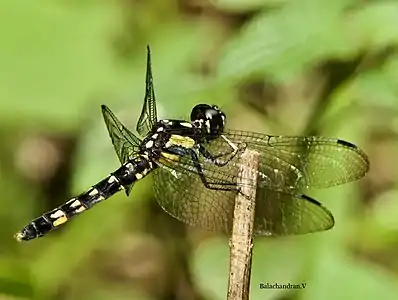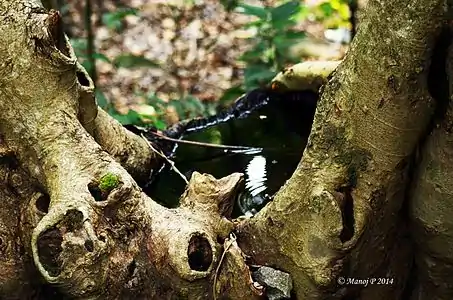Lyriothemis tricolor
Lyriothemis tricolor[2] is a species of dragonfly in the family Libellulidae. It is found in Bangladesh, China, India, Japan, Myanmar, and Taiwan.[1][3]
| Lyriothemis tricolor | |
|---|---|
.jpg.webp) | |
| male | |
| Scientific classification | |
| Kingdom: | |
| Phylum: | |
| Class: | |
| Order: | |
| Family: | |
| Genus: | |
| Species: | L. tricolor |
| Binomial name | |
| Lyriothemis tricolor Ris, 1919 | |
| Synonyms | |
|
Lyriothemis flava Oguma, 1922 | |
In India, Lyriothemis species were thought to be restricted to the northeastern states like Assam and West Bengal;[4] but, in 2013, L. acigastra and L. tricolor were recorded in the southern state of Kerala.[5][6]
Description
It is a medium sized dragonfly with brown-capped greenish-yellow eyes. Its thorax is black on dorsum, yellow on sides. There is a thick black oblique stripe on the posterior half of mesepimeron and postero-lateral suture. Wings are transparent, tinted with amber-yellow at base. Abdomen is blood-red, marked with black. Segment 1 is narrowly bordered with ochreous yellow. Segments 2 and 3 are ochreous laterally. All segments have very narrow black borders. Segments 3 to 9 has a narrow mid-dorsal black stripe, faded in adults. Segment 10 is entirely black. Anal appendages are dark reddish-brown.[4]
Female is similar to the male; but its thorax is coppery-brown and segments 3 to 8 with mid-dorsal carina rather broadly black.[4]
 Male; dorsal view
Male; dorsal view Male; side view
Male; side view Female
Female
Habitat

Its natural habitats are subtropical or tropical moist lowland forests and subtropical or tropical moist montane forests. Unlike other dragonflies and damselflies this species breeds in water collected inside the tree holes of evergreen and semi-evergreen forests.[6][7] Physicochemical parameters of water collected from the tree holes show that the water is generally acidic with high levels of total dissolved solids, phosphates, sulphates and nitrates. The pH varied from extremely acidic to (pH 3.56) to near neutral (pH 6.48). A diverse community of invertebrates and vertebrates coexist with L. tricolor larvae. It is not known how the different taxa interact in the community. However, the presence of predatory larvae of L. tricolor may significantly influence the community structure of tree holes.[6]
See also
- List of odonates of India
- List of odonata of Kerala
References
- Wilson, K. (2006). "Lyriothemis tricolor". IUCN Red List of Threatened Species. 2006: e.T12525A3353157. doi:10.2305/IUCN.UK.2006.RLTS.T12525A3353157.en.
- Martin Schorr; Dennis Paulson. "World Odonata List". University of Puget Sound. Retrieved 12 Oct 2018.
- K.A., Subramanian; K.G., Emiliyamma; R., Babu; C., Radhakrishnan; S.S., Talmale (2018). Atlas of Odonata (Insecta) of the Western Ghats, India. Zoological Survey of India. pp. 336–337. ISBN 9788181714954.
- C FC Lt. Fraser (1936). The Fauna of British India, including Ceylon and Burma, Odonata Vol. III. Red Lion Court, Fleet Street, London: Taylor and Francis. pp. 270–272.
- Emiliyamma KG; Palot Md; Radhakrishnan C; Balakrishnan VC (2013). "Lyriothemis acigastra: a new addition to the odonata fauna of Peninsular India". Taprobanica: The Journal of Asian Biodiversity. 5 (1): 73–4. doi:10.4038/tapro.v5i1.5672.
- Das, K.S.A.; K.A. Subramanian; K.G. Emiliyamma; M.J. Palot & K.A. Nishadh (2013). "Range extension and larval habitat of Lyriothemis tricolor Ris, 1919 (Odonata: Anisoptera: Libellulidae) from southern Western Ghats, India". Journal of Threatened Taxa. 5 (17): 5237–5346. doi:10.11609/JoTT.o3716.5237-46.
- "Lyriothemis tricolor Ris, 1919". India Biodiversity Portal. Retrieved 2017-02-13.
![]() Data related to Lyriothemis tricolor at Wikispecies
Data related to Lyriothemis tricolor at Wikispecies
![]() Media related to Lyriothemis tricolor at Wikimedia Commons
Media related to Lyriothemis tricolor at Wikimedia Commons
